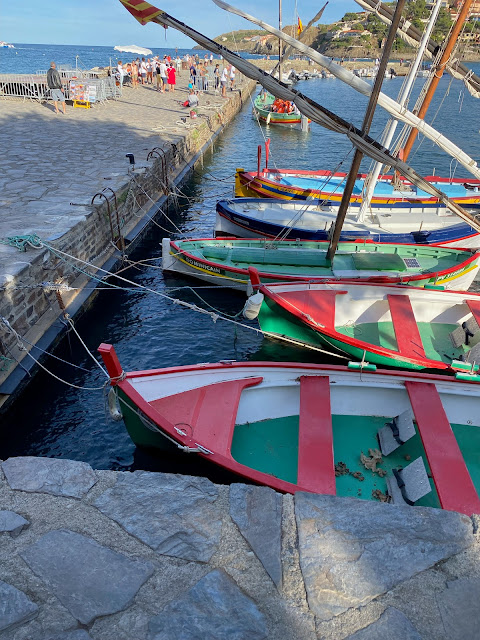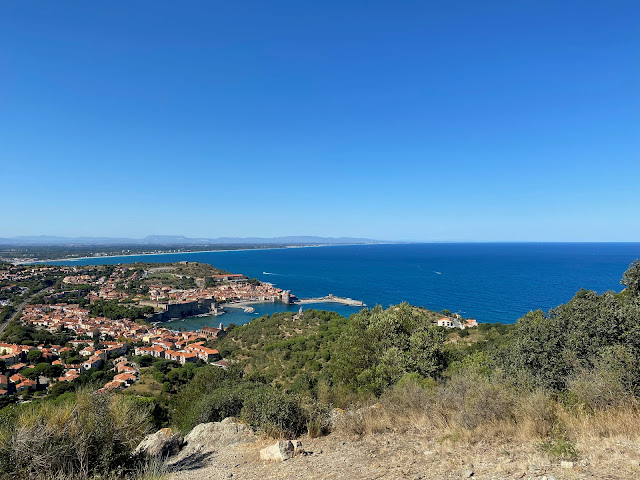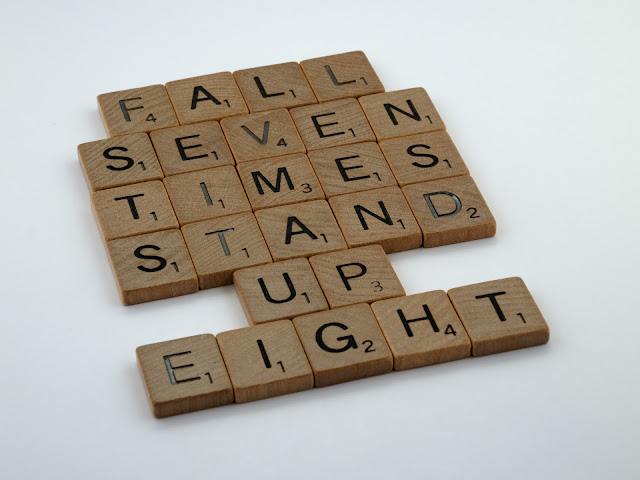Going Places & Standing Still
 |
Photo credit: C'est moi"What else are we going through this for, if not to have the work take us places?" — Manny Igrejas, playwright and publicist extraordinaire After spending the past two years hunched over my laptop or sitting on my couch watching nearly everything Netflix has to offer, I did a little (okay, a lot) of traveling this past month, and it was fantastic. In early September, I went to London to meet the team at Legend Press, which acquired the UK rights to The Perfect Neighborhood. It was a last-minute trip. One midsummer morning, the publisher's marketing manager sent me an invitation to a garden party celebrating the authors who'd released a book this year. She said she knew it was a long-shot given that I was in the US, but she didn't want me to feel excluded. Before I'd even finished reading her email, I was searching for flights. Yes, it seemed self-indulgent to cross the pond for a party and a handful of signing events (two of which were canceled due to Waterstones' computer-related issues) but I thought, "What if this is it? What if I never publish a book (in the US or UK) again and I miss my chance to enjoy it?" My mom subscribes to the theory that it's not the things in life we do that we regret, but rather the things we don't do. So I embraced that philosophy and went. And, reader, it was magical. My bookworm heart swelled exponentially talking with writers, editors, and reviewers. With authors Stela Brinzeanu & Emma Musty With author Jemma Wayne (far right) and our editor Cari, (middle) at Ink84Books |
About eight days later, I traveled to Collioure, France for the Karbohemia writing retreat, which I'd booked back in the spring as a belated 50th birthday gift to myself. (Who knows what you really want for your birthday better than you do, am I right?)
The setting was spectacular. In addition to a castle and the Mediterranean, I was surrounded by talented writers and their gorgeous words. Authors Karen Karbo and Michele Filgate (with special guest Nashville-based spoken word artist and singer/songwriter Minton Sparks) led the weeklong workshop. I went in with high expectations and they were surpassed.
Before arriving, attendees had the opportunity to send twelve pages that we'd discuss in one-on-one meetings with Karen and Michele. While I was in London, I wrote (and edited and scowled and rewrote) an essay that I hope could be the beginning of a new, non-fiction project.
Before arriving, attendees had the opportunity to send twelve pages that we'd discuss in one-on-one meetings with Karen and Michele. While I was in London, I wrote (and edited and scowled and rewrote) an essay that I hope could be the beginning of a new, non-fiction project.
I shared that piece and Karen and Michele offered insightful feedback that was encouraging but also made me think about what was missing and where I can go next with this idea.
One of my dear writer friends told me her grandmother had a saying: "You can never see your own hunchback." This friend and I rely on one another to point out the other's "hunchback."
When it comes to writing, there are often blind spots in your work and having someone there to help you see them (preferably before you've written yourself off a cliff) can make all the difference.
While I was away, I received a lovely email from my dear friend Manny (quoted above). I'd mentioned that I was in Europe and felt a bit guilty about leaving my family behind to focus on myself and my next projects. He wrote back, "What else are we going through this for, if not to have the work take us places?"
It was one of those moments when someone says the thing you need to hear at the perfect time.
As I've said dozens of times, so much of the writing life is a solitary endeavor. It's you and your laptop (maybe a cat and a cup of coffee if you're lucky).
Here's a poem I believe sums it up far more eloquently. It's been attributed to both Chilean poet Pablo Neruda and Brazilian writer Martha Medeiros. I can't say with certainty who authored it, but I hope it speaks to you.
All this to say, I'm extremely grateful for these opportunities to see new things both in the world and on the page.
Now I'm back and trying not to shout, "Where's my charcuterie board and rosé??!!" when it hits 6 p.m. and I come to the sad realization that I'm the one responsible for serving up a meal. Instead of reading and listening to fabulous essays, I'm sifting through school emails and getting back to the freelance hustle. As each day passes, my travels feel more like something I imagined.
While I was away, I received a lovely email from my dear friend Manny (quoted above). I'd mentioned that I was in Europe and felt a bit guilty about leaving my family behind to focus on myself and my next projects. He wrote back, "What else are we going through this for, if not to have the work take us places?"
It was one of those moments when someone says the thing you need to hear at the perfect time.
The work can provide a sweet escape (when you aren't wracking your brain for punchier verbs or a fresh way to open a chapter—or equally hard, end one.) I wrote a lot during the pandemic and having the chance to slip into a fictional world was a lovely diversion. So I'd say the work can absolutely take you places without ever leaving your home, but it's that much sweeter when it brings you to another country where you meet new people and hear their stories and share your own.
As I've said dozens of times, so much of the writing life is a solitary endeavor. It's you and your laptop (maybe a cat and a cup of coffee if you're lucky).
Another part I don't talk about as often is the waiting. In July, I turned in a new manuscript to my publishers, who contractually get a "first look," and I've been waiting to hear back. I joke that as a thriller writer, the suspense is killing me.
I had lunch with a friend last week. He's ghostwritten a memoir in essays for an American artist who has one fascinating tale after another. My friend is in the process of looking for an agent. He's sent out query letters but hasn't heard back. We commiserated about "the waiting."
I told him that when I first thought about writing a book, I imagined the hard part would be the actual writing—creating characters people cared about, setting up scenes, adding enough tension to keep readers from returning the book to the library unfinished.
It sounds incredibly naive, but it never occurred to me that the post-writing part would be just as difficult. The waiting (not to mention the rejection) can mess with your mind. And how do you pass the time while you wait? You can check your inbox every three minutes. You can doubt every compliment you've ever received and wonder if your mom is secretly paying people to be nice to you. You can debate looking for full-time openings at the nearby Taco Bell where you can drown your sorrows in discount chalupas. Or, you can get to work on your next idea and try to block out everything else.
Even better? If you can break up those in-between moments with new adventures, new friends, new stories, you'll remember why you're doing it in the first place.
Here's a poem I believe sums it up far more eloquently. It's been attributed to both Chilean poet Pablo Neruda and Brazilian writer Martha Medeiros. I can't say with certainty who authored it, but I hope it speaks to you.
"Muere lentamente" (Dying Slowly)
You start dying slowly
if you do not travel,
if you do not read,
If you do not listen to the sounds of life,
If you do not appreciate yourself.
You start dying slowly
When you kill your self-esteem;
When you do not let others help you.
You start dying slowly
If you become a slave of your habits,
Walking everyday on the same paths…
If you do not change your routine,
If you do not wear different colours
Or you do not speak to those you don’t know.
You start dying slowly
If you avoid to feel passion
And their turbulent emotions;
Those which make your eyes glisten
And your heart beat fast.
You start dying slowly
If you do not change your life when you are not satisfied with your job, or with your love,
If you do not risk what is safe for the uncertain,
If you do not go after a dream,
If you do not allow yourself,
At least once in your lifetime,
To run away from sensible advice…
if you do not travel,
if you do not read,
If you do not listen to the sounds of life,
If you do not appreciate yourself.
You start dying slowly
When you kill your self-esteem;
When you do not let others help you.
You start dying slowly
If you become a slave of your habits,
Walking everyday on the same paths…
If you do not change your routine,
If you do not wear different colours
Or you do not speak to those you don’t know.
You start dying slowly
If you avoid to feel passion
And their turbulent emotions;
Those which make your eyes glisten
And your heart beat fast.
You start dying slowly
If you do not change your life when you are not satisfied with your job, or with your love,
If you do not risk what is safe for the uncertain,
If you do not go after a dream,
If you do not allow yourself,
At least once in your lifetime,
To run away from sensible advice…
As always, thanks for reading.








Comments